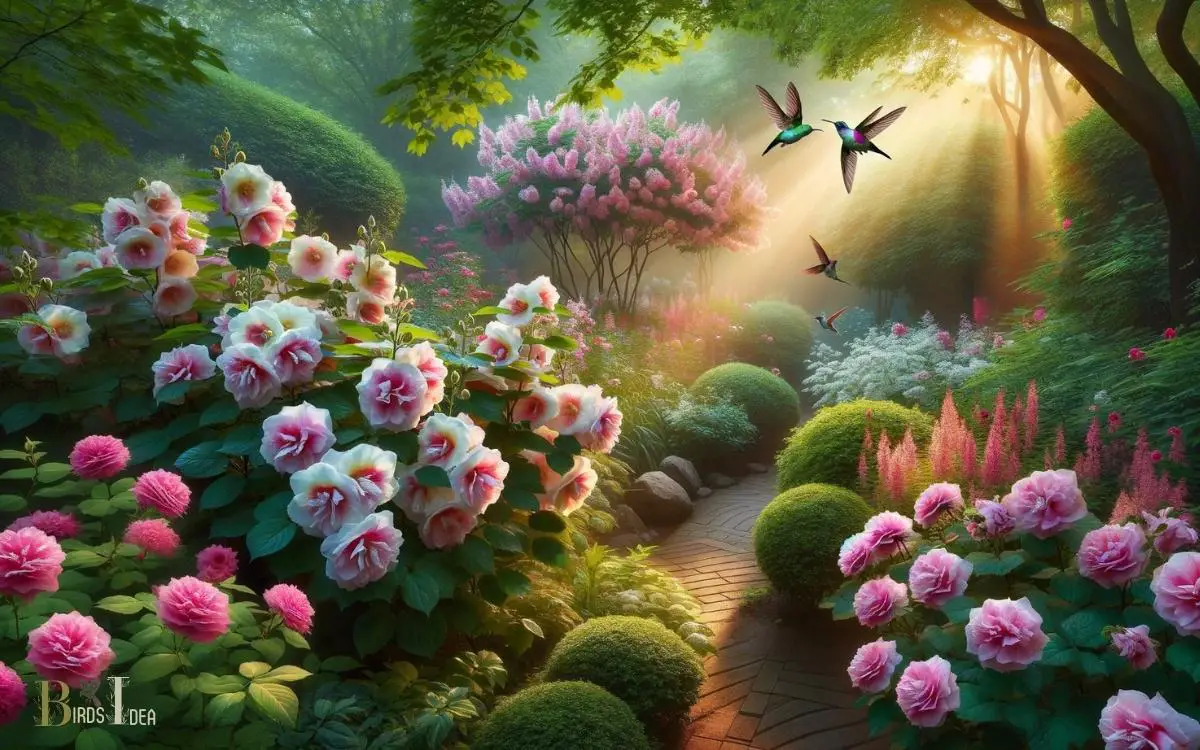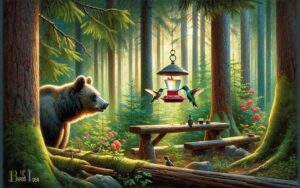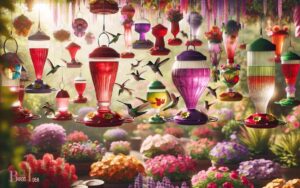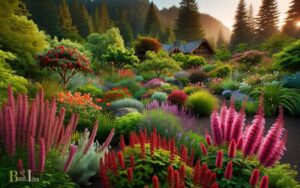Does Rose of Sharon Attract Hummingbirds? Yes!
Yes, the Rose of Sharon (Hibiscus syriacus) is known to attract hummingbirds. This flowering shrub features large, trumpet-shaped flowers rich in nectar, which is appealing to these tiny birds.
The Rose of Sharon is a popular ornamental plant that can serve as an excellent addition to a hummingbird-friendly garden.
Here’s why:
Perfect for adding a splash of color and wildlife to your garden, the Rose of Sharon is a hummingbird magnet with its vibrant, nectar-filled blossoms.

Key Takeaway
Characteristics of Rose of Sharon
Rose of Sharon plants produce vibrant, trumpet-shaped flowers that bloom in a variety of colors, including white, pink, and purple.
These flowers typically measure 2-4 inches across and have prominent, protruding yellow stamens at the center.
The plant itself is a member of the Hibiscus syriacus family, known for its hardy nature and ability to thrive in various soil types and climates.
Rose of Sharon is a deciduous shrub, shedding its leaves in the fall and regrowing them in the spring.
It can reach heights of up to 12 feet and is often used as a hedge or ornamental plant in gardens and landscapes.
Additionally, it is known for its tolerance to heat and drought, making it a popular choice for low-maintenance gardening.
Flowering Season of Rose of Sharon
The flowering season of Rose of Sharon is essential to understand for those seeking to attract hummingbirds to their garden.
Knowing the best blooming months of this plant can help gardeners plan their landscape to provide nectar for hummingbirds.
Additionally, understanding the ideal growing conditions for Rose of Sharon can ensure that it thrives and produces the vibrant blooms that attract hummingbirds.
Best Blooming Months
During the months of late summer and early fall, Rose of Sharon typically blooms, attracting hummingbirds with its vibrant flowers.
The flowering season of Rose of Sharon varies slightly depending on the specific climate and location.
In warmer regions, these plants may start blooming as early as July, while in cooler areas, the blooming period may extend into October.
The peak blooming months, however, generally occur in August and September. During this time, the plant is covered with large, showy blossoms in shades of pink, purple, blue, or white, which are highly attractive to hummingbirds.
This extended blooming period provides ample opportunity for hummingbirds to be drawn to the nectar-rich flowers, making Rose of Sharon a delightful addition to any garden.
Hummingbird Attraction to Rose of Sharon
Hummingbirds are attracted to Rose of Sharon due to its nectar-rich flowers. The vibrant and trumpet-shaped blooms of the Rose of Sharon serve as a natural food source for hummingbirds, attracting them to the garden or landscape.
Here are three key reasons why Rose of Sharon is particularly appealing to hummingbirds:
- Nectar Production: The flowers of the Rose of Sharon produce ample amounts of nectar, which is a primary food source for hummingbirds.
- Long Blooming Period: The Rose of Sharon blooms from midsummer to fall, providing a consistent nectar source for hummingbirds during their active feeding season.
- Attractive Colors: The bright and showy flowers of the Rose of Sharon, available in various hues such as pink, red, purple, and white, are visually appealing to hummingbirds, further attracting them to the plant.
Planting and Care Tips
Gardeners often find that planting Rose of Sharon in well-draining soil and providing regular watering and sunlight results in healthy, vibrant blooms.
Here are some planting and care tips to ensure the best growth and flowering of Rose of Sharon:
| Aspect | Tips |
|---|---|
| Soil | Well-draining soil is crucial for Rose of Sharon. Amend heavy clay soil with organic matter to improve drainage. |
| Watering | Regular watering, especially during dry spells, is essential for Rose of Sharon’s health and flower production. |
| Sunlight | Plant Rose of Sharon in a location that receives full sun for at least 6-8 hours a day to promote abundant blooming. |
| Pruning | Prune in late winter or early spring to encourage new growth and maintain a desired shape. Remove dead or weak branches. |
Following these tips will help ensure that your Rose of Sharon thrives and provides a beautiful, colorful addition to your garden.
Companion Plants for Attracting Hummingbirds
To attract hummingbirds to your garden, gardeners can plant companion plants that provide additional food sources and shelter.
There are several plants that can be added to your garden to attract and support hummingbirds.
Here are three great options to consider:
- Trumpet Vine (Campsis radicans): This vine produces vibrant, trumpet-shaped flowers that are irresistible to hummingbirds.
- Bee Balm (Monarda spp.): With its showy, nectar-rich flowers, bee balm is a favorite among hummingbirds.
- Salvia (Salvia spp.): The tubular flowers of salvias come in a variety of colors and are highly attractive to hummingbirds.
Observing Hummingbirds in Your Garden
The article explores how Rose of Sharon attracts hummingbirds and offers insights into observing their behavior in the garden. Observing hummingbirds in your garden can be a delightful and rewarding experience.
Here are a few tips to help you enjoy their presence:
- Strategic Placement: Positioning feeders and plants with nectar strategically around the garden can increase the chances of spotting hummingbirds.
- Patience and Stillness: Hummingbirds are easily startled, so it’s important to remain patient and still while observing them. Find a comfortable spot to sit and wait for their arrival.
- Binoculars and Field Guide: Using binoculars and a field guide can enhance the experience by allowing you to observe the hummingbirds up close and identify different species.
Observing hummingbirds in your garden can provide a deeper appreciation for these fascinating creatures and the natural world around us.
Conclusion
Yes, Rose of Sharon does attract hummingbirds. Its long blooming season and nectar-rich flowers make it a favorite of these tiny birds.
By planting and caring for Rose of Sharon, as well as incorporating other hummingbird-friendly plants, one can create a vibrant and inviting habitat for these beautiful creatures.
Observing hummingbirds in your garden can bring joy and wonder, making it a worthwhile endeavor to attract and support these delightful visitors.






